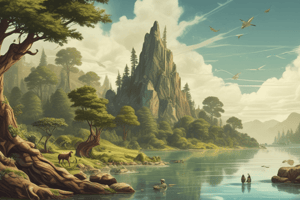Podcast
Questions and Answers
What does the case of the frogs with darker skin coloration demonstrate?
What does the case of the frogs with darker skin coloration demonstrate?
- Their ability to withstand high radiation levels (correct)
- Their need for camouflage from predators
- Their adaptation to extreme cold temperatures
- Their preference for dark environments
Why did natural selection favor smaller sizes in the snow voles according to the text?
Why did natural selection favor smaller sizes in the snow voles according to the text?
- To allow them to store more resources
- To enhance their survival rates in regions with limited resources (correct)
- To improve their ability to withstand extreme temperatures
- To increase their visibility to predators
In what way do the examples of frogs and snow voles challenge conventional wisdom?
In what way do the examples of frogs and snow voles challenge conventional wisdom?
- By illustrating the predictable nature of evolution
- By proving that genetic analysis is not a reliable tool in evolutionary studies
- By demonstrating that larger animals always have a survival advantage
- By suggesting that smaller size can be advantageous in certain environments (correct)
What does the text suggest about the relationship between organisms and their habitats?
What does the text suggest about the relationship between organisms and their habitats?
What role do environmental pressures play in the evolution of species according to the text?
What role do environmental pressures play in the evolution of species according to the text?
What does the study on snow voles teach researchers about the nature of evolution?
What does the study on snow voles teach researchers about the nature of evolution?
What is the primary focus of the field of biology?
What is the primary focus of the field of biology?
What was the remarkable discovery made near the Chernobyl nuclear power plant in 2024?
What was the remarkable discovery made near the Chernobyl nuclear power plant in 2024?
What was the observed correlation between the distance from the power plant and the tree frogs' skin coloration?
What was the observed correlation between the distance from the power plant and the tree frogs' skin coloration?
What is the primary function of melanin in organisms?
What is the primary function of melanin in organisms?
What is the process that favors traits that increase survival chances in harsh environments?
What is the process that favors traits that increase survival chances in harsh environments?
Which of the following is NOT a subdiscipline of biology mentioned in the text?
Which of the following is NOT a subdiscipline of biology mentioned in the text?
Study Notes
Biology: The Study of Living Organisms
Biology is a vast scientific field encompassing the study of living beings and their interactions with their environment. It seeks to understand the nature of life, the intricate connections between different organisms, and the processes governing their existence. Biology includes various subdisciplines, such as ecology, molecular biology, genetics, and zoology, to name a few. Let's delve into two captivating examples drawn from the realm of biology to illustrate the beauty of this science.
Radiation Adaptation in Tree Frogs
In 2024, researchers discovered something remarkable near the Chernobyl nuclear power plant. Despite the massive release of radiation following the catastrophic accident in 1986, a subset of tree frogs managed to adapt to their surroundings. By analyzing the skin coloration of these amphibians, scientists noticed a correlation between the distance from the power plant and the darkness of the frogs' skin. The frogs closer to the plant were significantly darker, indicating a higher concentration of melanin, a pigment known to protect organisms against radiation.
This finding provides a glimpse into the mechanisms underlying evolutionary adaptation. Natural selection favors traits that increase survival chances, such as the capacity to cope with harsh environmental conditions. In this case, the frogs' darker skin coloration may have conferred a protective advantage, enabling them to endure the elevated radiation levels around the power plant. This phenomenon highlights the dynamic relationship between organisms and their habitats, emphasizing the resilience of life in the face of adversity.
Voles Shrinking: An Unseen Evolutionary Change
A study conducted on a population of snow voles in their alpine habitat revealed surprising results. Genetic analysis suggested a previously undocumented evolutionary shift in the size of these rodents. Though it may seem counterintuitive for natural selection to favor smaller sizes, a closer examination reveals that smaller individuals often possess advantages in certain environments. For instance, smaller animals may consume fewer resources, leading to enhanced survival rates in regions with limited resources.
This discovery underscores the complex and multifaceted nature of evolution. It challenges conventional wisdom and encourages researchers to continue investigating the myriad factors influencing the development and adaptation of living organisms.
These compelling examples demonstrate the richness and diversity of biology, highlighting the profound impact of environmental pressures on the evolution of species. They also serve as a testament to the ongoing pursuit of knowledge in the life sciences, offering valuable insights into the mysteries of life itself.
Studying That Suits You
Use AI to generate personalized quizzes and flashcards to suit your learning preferences.
Description
Explore fascinating examples of evolutionary adaptation in living organisms, including radiation adaptation in tree frogs near Chernobyl and the shrinking size of snow voles. These cases showcase the intricate relationship between organisms and their environments, shedding light on the mechanisms of evolution and natural selection in biology.




